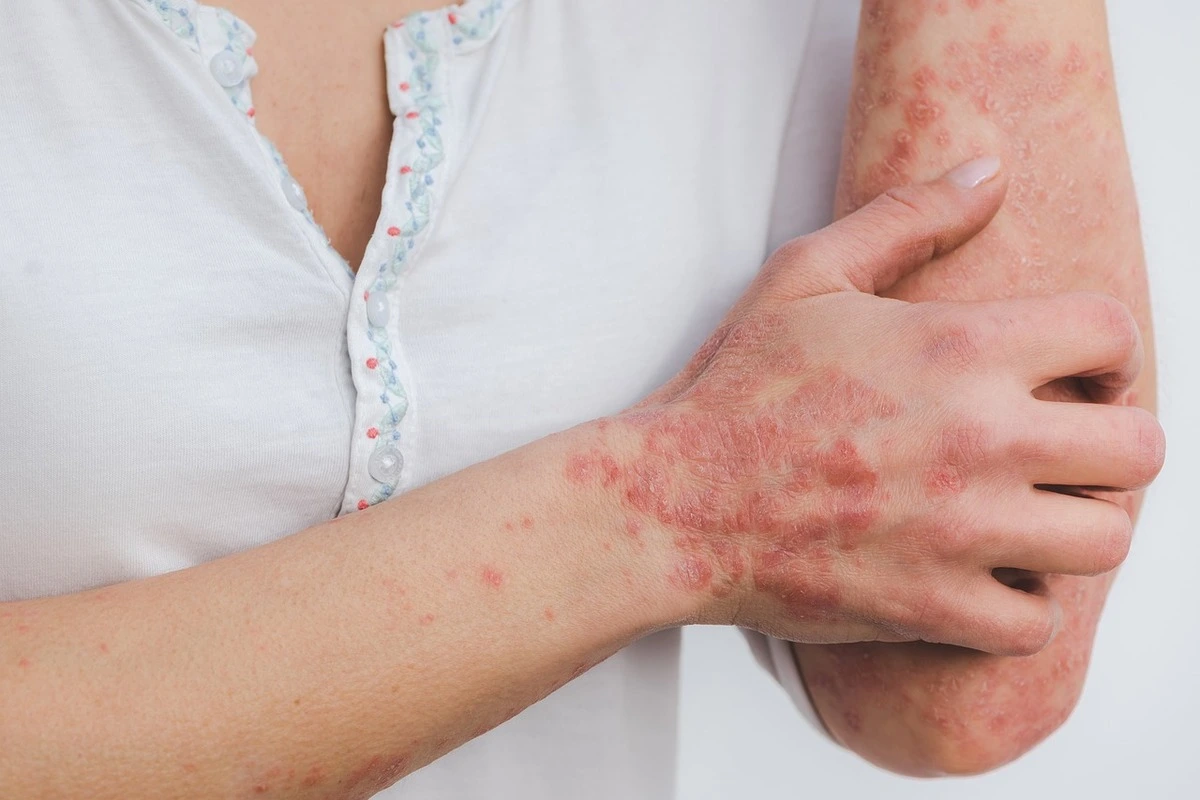WHAT IS PSORIASIS?
Psoriasis is an autoimmune disorder characterized by epidermal thickening and scaling or in other words, epidermal hyperplasia (overgrowth of the epidermis) in which there is accelerated epidermal turnover. It is non-contagious and chronic (long-term). It commonly affects extensor surfaces (muscles that straighten limbs or body parts) Sand the scalp.
SIGNS AND SYMPTOMS
Rashes on brown or black skin appear as purple shades with gray scales, while on white skin they are pink or red with silver scales. On dry skin, these patches may bleed and become inflamed. Additionally, scratching and itching are common in psoriasis.
TYPES OF PSORIASIS
There are many types of psoriasis, and signs and symptoms vary with each.
• Plaque Psoriasis: Characterized by raised, red, scaly patches, especially on elbows, knees, scalp, and back.
• Scalp Psoriasis: Affects the scalp and is sometimes mistaken for dandruff.
• Nail Psoriasis: Involves nail changes and often occurs with other psoriasis types.
• Guttate Psoriasis: Small red bumps smaller than a fingertip that scatter on the legs, arms, and torso.
• Inverse Psoriasis: Appears in skin folds like the groin, armpits, and under the breasts—usually triggered by sweat and friction, particularly in obese people.
• Pustular Psoriasis: Characterized by pus-filled bumps, indicating skin barrier damage and infection risk.
• Erythrodermic Psoriasis: A severe form that affects the whole body and resembles burns; it requires immediate medical attention.
FACTORS THAT TRIGGER PSORIASIS
Importantly, psoriasis can be triggered or worsened by:
• Cold, dry weather
• Skin trauma (cuts, scrapes, surgery)
• Genetic predisposition
• Smoking or alcohol consumption
• Bacterial infections like streptococcal infection
• Obesity
• Emotional stress
• Abrupt withdrawal of corticosteroids or misuse of potent topical steroids
• Furthermore, certain medications such as lithium, chloroquine, hydroxychloroquine, beta-blockers, NSAIDs, ACE inhibitors, and interferons can induce or worsen psoriasis.
Research in The Journal of the American Academy of Dermatology (2020) confirms that drug-induced psoriasis is clinically distinct, often with delayed onset and unique histopathology.
AFTER HOW LONG CAN DRUGS CAUSE PSORIASIS?
The latency period the time between starting medication and psoriasis onset varies by drug. For some drugs, it is short; for others, much longer.
POSSIBLE MECHANISM OF ACTION
While the exact mechanism remains unclear, psoriasis results from an autoimmune and inflammatory process. The immune system misfires, sending incorrect signals that cause healthy skin cells to multiply rapidly. Cytokines (like interleukin-17 and TNF-alpha) play a major role in sustaining inflammation, leading to thickened, scaly plaques. Studies published in Nature Reviews Immunology (2021) highlight the key roles of T-cells, dendritic cells, and keratinocytes in this process.
COMORBIDITIES ASSOCIATED WITH PSORIASIS
Chronic inflammation links psoriasis with several comorbidities.
• Psoriatic Arthritis: Over time, psoriasis can affect joints, spine, and connective tissues, causing stiffness and swelling. Early treatment prevents irreversible joint damage.
• Metabolic Syndrome: Psoriasis severity correlates with obesity, insulin resistance, and hypertension. A 2019 JAMA Dermatology study found psoriatic patients are twice as likely to develop metabolic syndrome.
• Cardiovascular Disease: Persistent inflammation elevates heart disease risk, particularly in women with psoriatic arthritis.
• NAFLD and Cirrhosis: Psoriatic patients with nonalcoholic fatty liver disease (NAFLD) have higher risks of liver fibrosis and cirrhosis due to inflammatory mediators.
• Erectile Dysfunction: Genital lesions and psychological distress can reduce libido and sexual satisfaction.
• Psychological Disorders: Anxiety, depression, and suicidal ideation are significantly more prevalent in psoriasis patients (British Journal of Dermatology, 2022).
• Other Associations: Conjunctivitis, uveitis, celiac disease, and Crohn’s disease are also linked.
DO PSORIATIC PLAQUES CAUSE ITCHING?
Yes. Inflammatory mediators in psoriatic plaques send itch signals to the brain. However, scratching worsens the lesions and triggers new ones a phenomenon known as the Koebner response. Itching intensifies at night due to increased body temperature and decreased cortisol, which normally suppresses inflammation. Stress further exacerbates this cycle.
PSORIASIS AND MENTAL HEALTH
Notably, psoriasis carries immense physical and psychosocial burdens. Patients often struggle with low self-esteem, embarrassment, and social withdrawal. The visible nature of the disease leads to stigma and isolation, while chronic itching, pain, and fatigue contribute to irritability and emotional exhaustion.
Furthermore, stress aggravates inflammation, creating a vicious cycle. Many patients experience alexithymia difficulty identifying or expressing emotions.
Studies in The Lancet Psychiatry (2023) confirm that depression and anxiety occur in nearly 40–60% of psoriasis patients, and untreated psychological stress can worsen flare-ups.
Importantly, psoriasis management must address both physical and emotional aspects. Treatment that improves skin symptoms whether topical therapy, phototherapy, or biologics also significantly reduces depressive symptoms.
CONCLUSION
Through lifestyle modification, topical and systemic treatments, and mental health support, psoriasis can be effectively managed. A multidisciplinary approach involving dermatologists, psychologists, and nutritionists can enhance outcomes and quality of life. Addressing both skin and mind is the key to long-term wellness.
FREQUENTLY ASKED QUESTIONS (FAQs)
1. Is psoriasis contagious?
No. Psoriasis is an autoimmune disease, not an infection, so it cannot spread from person to person.
2. Can stress alone cause psoriasis?
Stress doesn’t cause psoriasis by itself but can trigger or worsen flare-ups through immune and hormonal changes.
3. Does diet affect psoriasis?
Yes. Diets rich in omega-3 fatty acids, antioxidants, and anti-inflammatory foods (like fruits, vegetables, and fish) may reduce symptoms.
4. Can psoriasis go away completely?
It can go into remission for months or years with proper management, but relapses may occur.
5. Which doctor should treat psoriasis?
A dermatologist should lead treatment, often in collaboration with a psychologist and rheumatologist for joint or emotional involvement.
DISCLAIMER
This article is for educational purposes only and does not replace professional medical advice. Always consult a qualified healthcare provider before starting or changing any treatment for psoriasis or related conditions.
CALL TO ACTION
If you or someone you know struggles with psoriasis, don’t face it alone. Early diagnosis, consistent treatment, and emotional support can make a profound difference. Seek help from a dermatologist and mental health professional to regain confidence and control over your well-being.
REFERENCES
1. Elmets CA, et al. “Joint AAD-NPF guidelines of care for the management and treatment of psoriasis.” Journal of the American Academy of Dermatology. 2020.
2. Griffiths CEM, Armstrong AW, et al. “Pathophysiology and treatment of psoriasis.” Nature Reviews Immunology. 2021.
3. Kurd SK, et al. “Psoriasis and the risk of depression, anxiety, and suicidality.” Archives of Dermatology. 2010.
4. Takeshita J, et al. “Psoriasis and comorbid diseases: Epidemiology.” JAMA Dermatology. 2019.
5. Kimball AB, et al. “Psychological burden of psoriasis: A systematic review.” British Journal of Dermatology. 2022. 6. The Lancet Psychiatry Commission on Skin and Mental Health. The Lancet Psychiatry. 2023.





Drug information. Some are medicines that help people when doctors prescribe.
[url=https://azithromycins.com/]buy zithromax online fast shipping[/url]
Definitive journal of drugs and therapeutics. All trends of medicament.
Your article gave me a lot of inspiration, I hope you can explain your point of view in more detail, because I have some doubts, thank you.
Your article gave me a lot of inspiration, I hope you can explain your point of view in more detail, because I have some doubts, thank you.
Your article gave me a lot of inspiration, I hope you can explain your point of view in more detail, because I have some doubts, thank you.
What i don’t understood is in reality how you’re now not really a lot more smartly-favored than you might be now. You’re very intelligent. You understand therefore significantly in terms of this topic, produced me personally believe it from a lot of numerous angles. Its like women and men are not interested except it is one thing to accomplish with Woman gaga! Your own stuffs outstanding. Always care for it up!
Your passion for this topic shines through in your writing It’s clear that you put a lot of effort and thought into your posts Thank you for sharing your knowledge with us
Your writing is so eloquent and heartfelt It’s impossible not to be moved by your words Thank you for sharing your gift with the world
Thank you for the amazing blog post!
Your blog posts never fail to entertain and educate me. I especially enjoyed the recent one about [insert topic]. Keep up the great work!
Thank you very much for sharing, I learned a lot from your article. Very cool. Thanks.